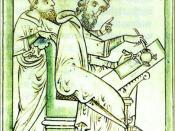Reflection of Good on Justice in Plato's Republic Book II Within the close of Book II of Plato's Republic, Thrasymachus and Glaucon are still unconvinced of Socrates' perceptions on justice. They both accuse Socrates in rejecting every idea that is proposed on the matter and stubbornly refuses to provide his own perspectives. At this time Glaucon demands more from Socrates to truly convince him that the benefits of being unjust truly outweigh the benefits of being just. Glaucon challenges Socrates to prove that regardless of the favourable or acceptable appearance and reputation associated with justice, man still exhibits an overwhelming desire to live an unjustly life. It is through Glaucon's imperfect defense that Socrates demonstrates his theory of justice, based on the argument that only a truly just man lives a valuable and meaningful life of true happiness and understanding.
Glaucon begins a discussion on justice by introducing three categories of various actions.
The first type of action is one that is performed for its own sake. These actions are described as "harmless pleasures that have no results beyond the joy of having them"(357b). The second one is for its own sake, as well as for the sake of its consequences. Lastly is an action that is performed merely "for their own sakes, but for the sake of the rewards and other things that come from them." Example may be "the various ways of making money"(357d).
Socrates places justice in the second category stating that, "I myself put justice among the finest goods, that man who is to be happy or blessed must want for its own sake and for its consequences"(358a). Glaucon challenges Socrates' perception "is not the opinion of the many. I want to know what justice and injustice are and what power each itself has...


